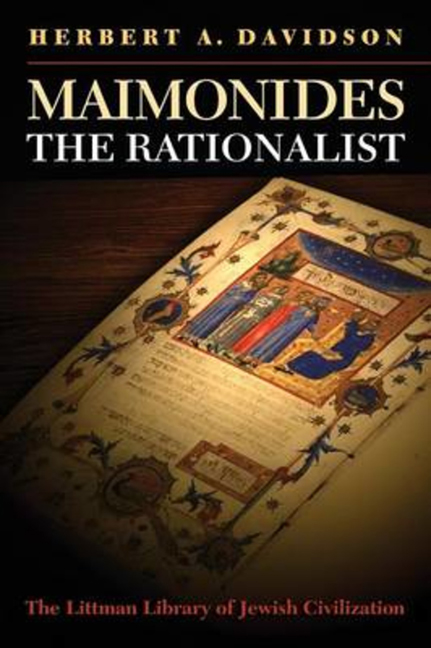Book contents
- Frontmatter
- Dedication
- Preface and Acknowledgements
- Contents
- Publisher's Note on Transliteration
- Abbreviations and Note on Sources
- 1 The Study of Philosophy as a Religious Obligation
- 2 The First Two Positive Divine Commandments
- 3 Maimonides' Knowledge of the Philosophical Literature in his Rabbinic Period
- 4 Maimonides' Shemonah perakim and Alfarabi's Fuṣūl Muntaza'a
- 5 Maimonides' Knowledge of the Philosophical Literature in his Later Period
- 6 Maimonides on Metaphysical Knowledge
- 7 A Problematic Sentence in Moreh nevukhim, ii. 24
- 8 Maimonides' Ethical Systems
- 9 Maimonides the Rationalist
- Works Cited
- Index
8 - Maimonides' Ethical Systems
- Frontmatter
- Dedication
- Preface and Acknowledgements
- Contents
- Publisher's Note on Transliteration
- Abbreviations and Note on Sources
- 1 The Study of Philosophy as a Religious Obligation
- 2 The First Two Positive Divine Commandments
- 3 Maimonides' Knowledge of the Philosophical Literature in his Rabbinic Period
- 4 Maimonides' Shemonah perakim and Alfarabi's Fuṣūl Muntaza'a
- 5 Maimonides' Knowledge of the Philosophical Literature in his Later Period
- 6 Maimonides on Metaphysical Knowledge
- 7 A Problematic Sentence in Moreh nevukhim, ii. 24
- 8 Maimonides' Ethical Systems
- 9 Maimonides the Rationalist
- Works Cited
- Index
Summary
God is not an enemy of the body, who wants its destruction.
MAIMONIDES Shemonah perakim, chapter 4When the claims of matter beckon him [who chooses to be truly a man and not a beast in man's shape and figure] to its dirt and … shame, he is pained at being immersed in it. He is embarrassed and ashamed … and tries to … safeguard himself from it at all costs, like someone whom the sovereign became angry with and commanded to carry manure from one place to another in order to humiliate him.
MAIMONIDES Moreh nevukhim, iii. 8Commentary on the Mishnah; Shemonah perakim
THE ETHICAL THEORY OF Maimonides’ earlier period rests on a pair of interrelationships—between a person's actions and the characteristics in his soul, and between moral virtue and the intellectual life.
Actions and characteristics in the soul form a tight circle. Repeatedly performing an action creates a habit (Arab.: hay'a) in the conative, or appetitive, (Arab.: nuzū'iyya; Heb.: mitorer) faculty of the soul. Once the characteristic takes root, it manifests itself in the performance of additional actions of the sort that created it. The cycle is not hermetically closed, for, Maimonides insists, human beings never lose freedom of choice. By an exercise of will, a person can break free and initiate actions in opposition to the characteristics in his soul, no matter how firmly they are ingrained. Those actions will then feed back and alter the characteristics.
Despite the close link between actions and psychological characteristics, the latter alone are the locus of virtue and vice. Actions may be good or bad, but they are not properly described as virtuous or vicious; only characteristics in the soul are. Alfarabi, from whom Maimonides borrowed most of his ethical theory at this stage of his career, made a similar point although he did not place as much weight on it as Maimonides. The ultimate source is Aristotle's Nicomachean Ethics, but there is no reliable evidence that Maimonides saw that work at the present stage of his career.
As for the other interrelationship, between moral virtue and the intellectual life, Maimonides maintains in the Commentary on the Mishnah that philosophers and prophets concur in taking the ‘goal of the human species’ to be the ‘conceiving of intelligible thoughts’.
- Type
- Chapter
- Information
- Maimonides the Rationalist , pp. 235 - 267Publisher: Liverpool University PressPrint publication year: 2011

